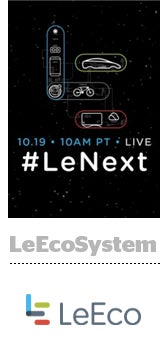 LeEco, the Chinese electronics company that shelled out $2 billion for smart TV manufacturer Vizio in July, held a splashy event Wednesday in San Francisco to mark its entry into the US, where it could one day give Apple a run for its money.
LeEco, the Chinese electronics company that shelled out $2 billion for smart TV manufacturer Vizio in July, held a splashy event Wednesday in San Francisco to mark its entry into the US, where it could one day give Apple a run for its money.
Beyond making a selection of its smart devices available in the US, one of the first orders of business is to launch a video streaming platform with several content partners, including Netflix, Sling, Food Network, Vice, Lionsgate, Showtime, Magnolia Pictures, Cosmopolitan, MGM, The History Channel, Lifetime, Pandora, AwesomenessTV, A&E and Tastemade, among others.
It’s LeEco’s answer to the content discovery challenge, although a number of streaming biggies are absent from its launch list, including Hulu and Amazon.
“Today, the content landscape tends to overwhelm with quantity rather than quality,” said Jeff Brill, GM of content at LeEco North America. “Today, we’re launching a video streaming platform, including all must-have services preloaded across devices and platforms.”
This could be where LeEco starts to make use of its Vizio acquisition, although there were no specifics mentioned.
“We announced that we acquired Vizio to establish a meaningful connection and distribution footprint, laying the groundwork for an open platform,” Brill said.
As part of July acquisition, LeEco spun off Inscape, Vizio’s data mining business, into a separate standalone entity, likely to avoid awkward regulatory scrutiny. Before LeEco came a-knocking, Vizio was on the Federal Trade Commission’s radar and the subject of multiple class-action lawsuits for alleged privacy violations, mainly for collecting and reselling TV viewership data without user opt-in.
But legal and potential regulatory headaches aside, personalization sits at the heart of what LeEco wants to achieve.
In the words of CEO and founder YT Jia, speaking through a translator at the event, LeEco sees itself as the “perfect combination of technology, culture, cars and the internet.”
It might sound grandiose, but not for lack of ambition. LeEco started life in 2004 as a digital streaming service – people are fond of calling it the “Netflix of China” – before going on to manufacture affordable smart TVs, phones, a VR headset, a smart bike (for some reason) and, soon, an autonomous car (still in the concept phase). The idea is to integrate content across the whole shebang.
“Through vertical integrations, we bring platforms, hardware, software, content and applications together so we can ensure our users enjoy a seamless experience everywhere in our ecosystem,” said Richard Ren, CEO of LeEco North America and president of LeEco’s global smart devices business.
LeEco, which is headquartered in Beijing with a new office in San Jose, plans to hire 12,000 people in Silicon Valley. It’s a full-court press into the US.
“America is the most important global market for us and Americans are the most mature consumers,” Jia said. “Once we have the hearts and minds of American users, we can move on to the hearts and minds of global users.”
Although Jia claimed this aggressive push into the US isn’t about throwing the gauntlet down in Apple’s backyard, that pretty much seems to be the strategy.
“Apple is a closed loop,” Jia said. “LeEco is an open loop, a complete ecosystem.”











